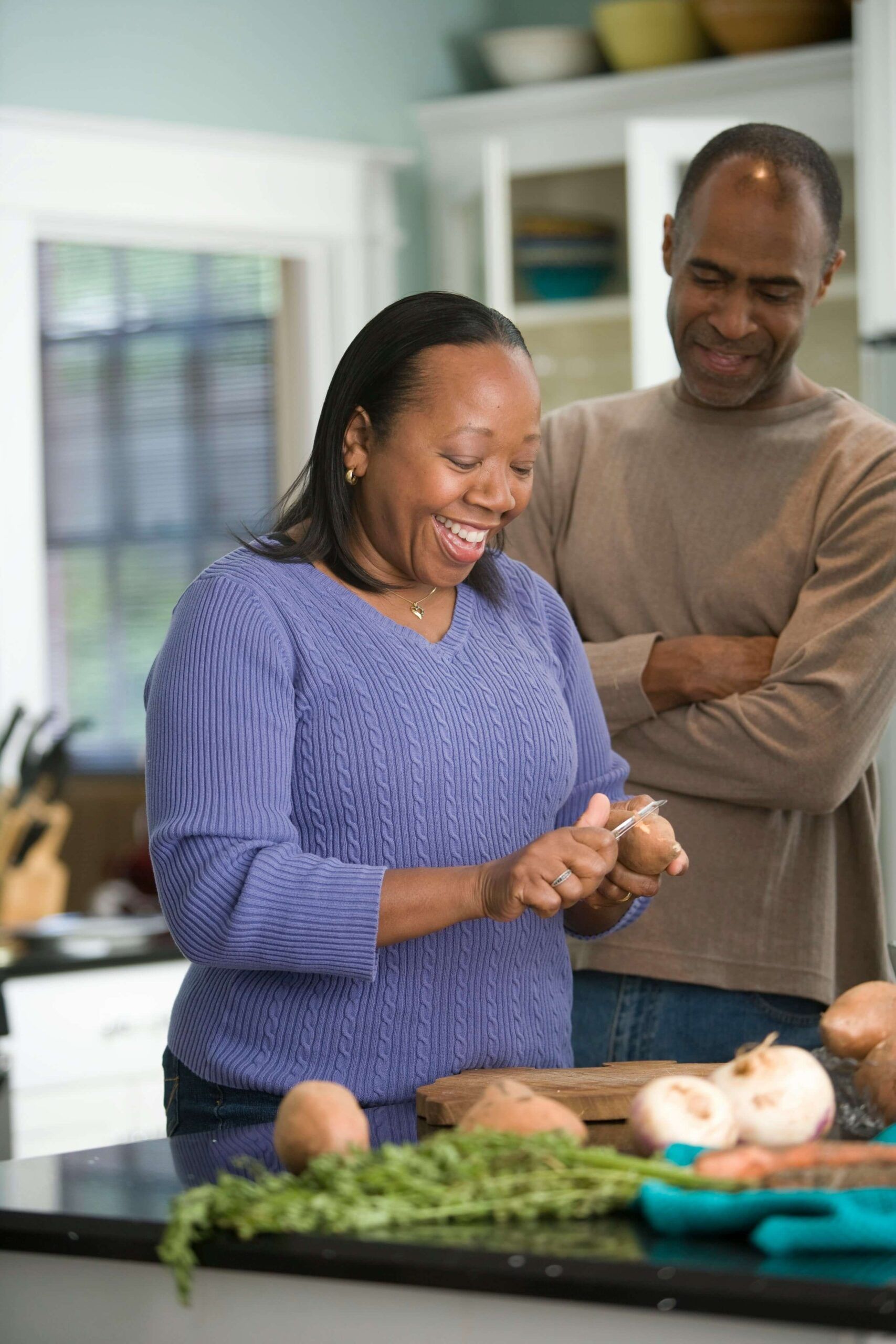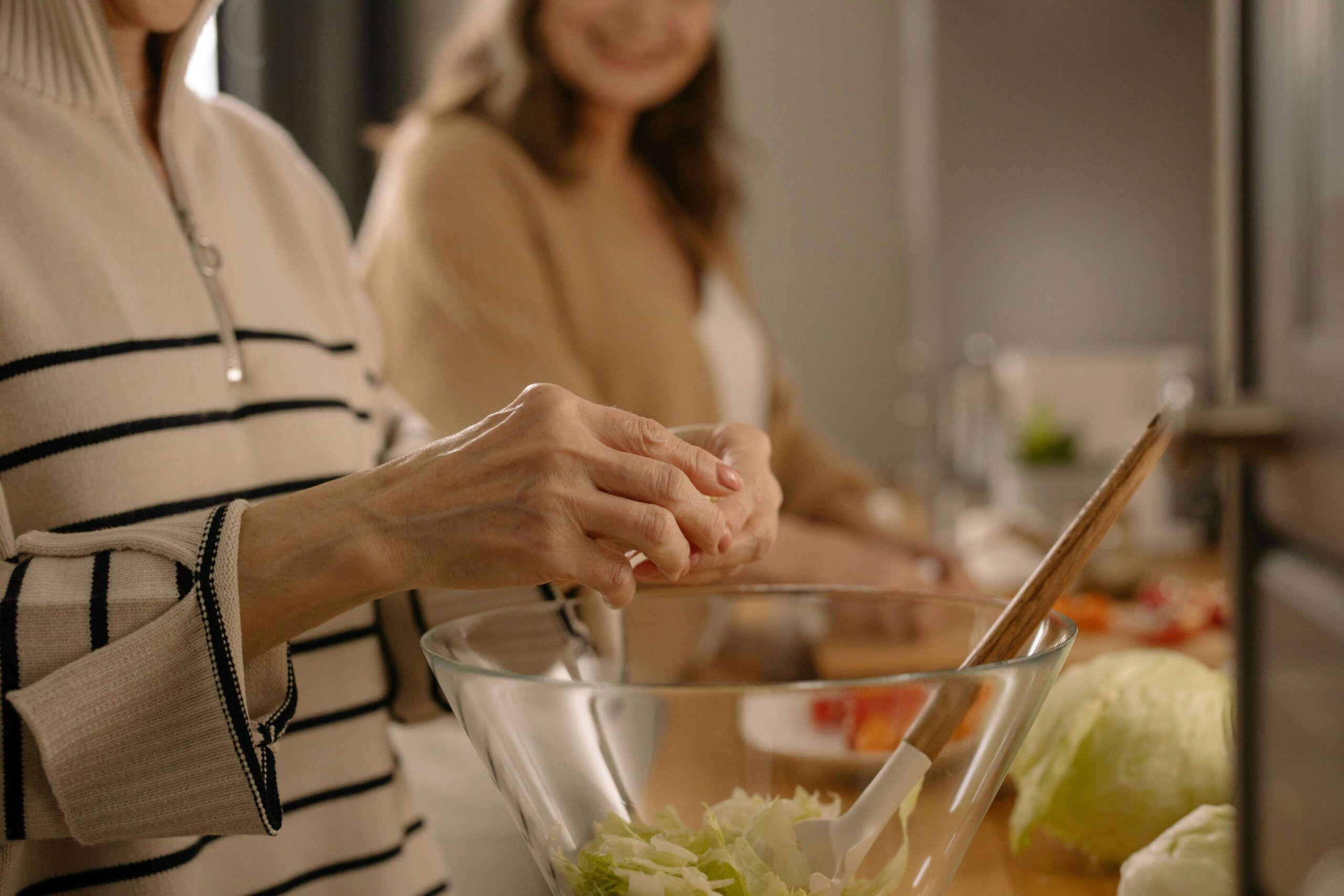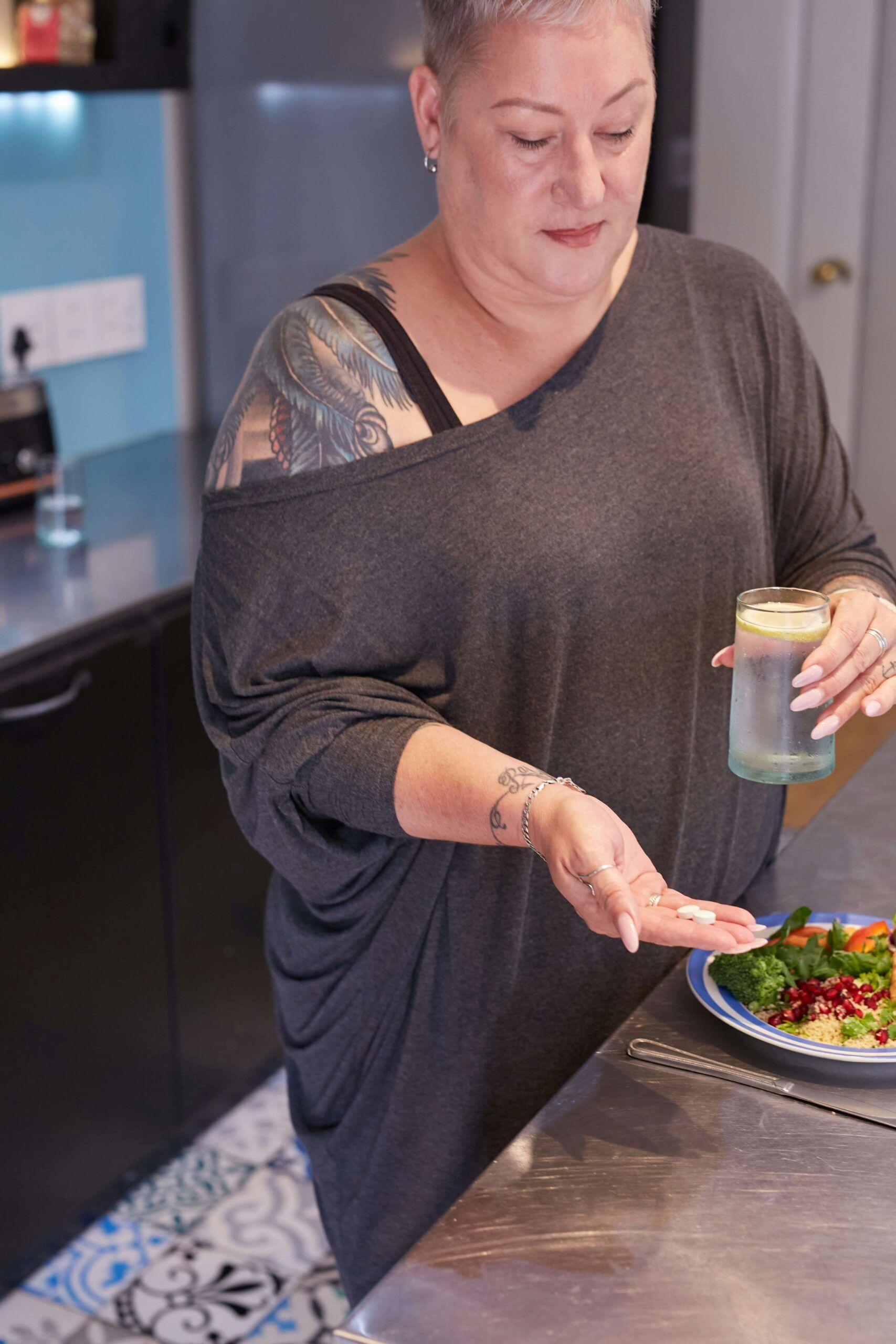You’re Not Lazy—Your Brain Is Wired Differently: Nutrition Counseling for Neurodivergent Adults
You’ve heard it your whole life: “Just meal prep on Sundays.” “Why don’t you plan ahead?” “Eating healthy isn’t that hard.” But for you, it feels impossible. Maybe it looks like standing in front of the open fridge, paralyzed by decisions. Forgetting to eat until you’re shaky and irritable. Ordering takeout again because cooking feels like climbing a mountain, and then that heavy, familiar wave of shame settles in. If you’ve been called lazy about food your whole life, please hear this: you’re not lazy. Your brain is wired differently. Whether that’s ADHD, autism, or another form of neurodivergence, nutrition counseling in Raleigh, NC, designed specifically for neurodivergent adults, can help.
The exhaustion you feel around meal planning, grocery shopping, and cooking isn’t a character flaw. It’s executive dysfunction, sensory processing differences, and time blindness colliding with a food system designed for neurotypical brains. But here’s the hope: this kind of specialized support doesn’t try to force you into systems that will never fit. Instead, it builds nourishment routines around how your brain actually works. This isn’t about becoming someone you’re not. It’s about finally having tools designed for your actual operating system.
When “Just Meal Prep on Sundays” Isn’t Helpful Advice
Let’s talk about what’s really happening when you struggle with nourishment. Executive dysfunction makes the cognitive load of deciding what to eat three times a day genuinely overwhelming. “What sounds good?” becomes an impossible question when your brain offers either zero answers or seventeen conflicting ones. You might find yourself standing in the grocery store, paralyzed by too many choices, or staring at a restaurant menu until the server comes back three times. By the time you finally make a decision, you’re often too depleted or too hungry to actually follow through with cooking. Then there are sensory sensitivities that go far beyond simple preferences.
Certain textures might feel genuinely unbearable in your mouth. Strong smells can trigger overwhelm or even nausea. The visual presentation of food affects whether it registers as “safe” or “wrong” to your nervous system. Temperature sensitivities mean that food that’s slightly too hot or too cold becomes inedible, even if you’re hungry. Time blindness and interoception challenges create their own maze of difficulties. You might miss hunger cues entirely until you’re suddenly ravenous or shaky. Perhaps you don’t notice fullness until you’re uncomfortably stuffed.
Time Slips Away, And Eating Becomes Something You Genuinely Forget You Need To Do.
Lunch feels recent, but a glance at the clock reveals it was actually eight hours ago. And if you have a hyperfocus pattern, you might get so absorbed in a task that ten hours pass without food. You realize at 9 pm that your only intake today was coffee. The “ADHD meal” of random snacks eaten while standing in the kitchen becomes your default. It’s not because you want it to be, but because it’s all your brain can manage. This isn’t laziness, and this isn’t a lack of discipline. Your brain is processing information differently, and that’s okay. You deserve support that understands this reality.
You’ve Tried the Traditional Way, And It Didn’t Work
You’ve seen the meal prep content. Those beautiful glass containers are filled with perfectly portioned meals for the week. It looks so simple, so organized, so achievable. Except it’s not. Not for your brain. Creating those perfect meal prep containers requires sustained executive function that you might not have, especially after a full day of work. Multi-step recipes feel impossible when decision fatigue has already drained your cognitive resources. And even if you manage to prep everything, eating the same meal for five days straight can be tough. It might lead to such intense sensory boredom that you can’t bring yourself to eat it. Those forgotten containers languish in the back of your fridge, eventually becoming science experiments that compound your guilt about wasted food and wasted effort.
Restrictive diet culture makes everything worse for neurodivergent brains. Lists of “good” and “bad” foods add cognitive load to an already overloaded system. Tracking requires sustained attention and working memory. Rigid meal times don’t account for time blindness or the fact that your hunger doesn’t arrive on a schedule. When you inevitably “fail” at following the plan, the shame spiral begins. You tell yourself you’re just not trying hard enough, when the truth is the system was never designed for you. There’s also what we might call the energy paradox.
You Need Energy To Make Food, And You Need Food To Have Energy.
Getting stuck in this exhausting loop often leads to ordering takeout again, which then triggers shame about spending money and “not taking care of yourself properly.” Traditional nutrition plans don’t account for how drastically your sensory needs can shift from day to day. They don’t include backup plans for when executive function crashes completely. They operate on all-or-nothing thinking: if you can’t follow the plan perfectly, the whole thing falls apart. This is where working with a registered dietitian in Raleigh, NC, who truly understands neurodivergence changes everything. We build systems around your brain’s actual wiring, not some idealized version of how you “should” function.
Building Systems That Work With Your Brain, Not Against It
Neurodivergent-affirming nutrition counseling starts by radically reducing decision fatigue. Together, we might create a “rotation menu” of five to seven safe meals that you can cycle through without thinking. We build “if-then” plans: “If I’m overwhelmed, I eat X.” and we identify what we call “dopamine foods”. These are meals that are easy, satisfying, and don’t require executive function you don’t have. And here’s something important: you have full permission to eat the same breakfast for months or even years if it works for you. Variety for the sake of variety isn’t a requirement for nourishment. Accommodating your sensory needs is central to this work. We spend time identifying your specific sensory profile with food. What textures feel good in your mouth? Even: What temperatures and what flavors? We build a list of foods that work for your nervous system, and there is zero judgment for “safe foods” or what diet culture might dismiss as “kid foods.”
If chicken nuggets and plain pasta are what your body tolerates right now, that’s valuable information, not something to fix. From there, we can gently explore how to add variety over time without triggering sensory overwhelm, but only if and when you’re ready. Working with time blindness requires creative strategies. Setting alarms or phone reminders for meal times can help. Keeping grab-and-go options visible is crucial because for many neurodivergent brains, out of sight genuinely means it doesn’t exist. “Snack plates” with several small items can feel more manageable than a full meal when cooking feels impossible. Some people benefit from body doubling, which involves having someone else present (even virtually) while preparing food. This technique helps reduce the task resistance that often comes with executive dysfunction.
If You Experience Hyperfocus, We Build Systems That Honor That Instead of Fighting It.
Pre-portioned snacks in your workspace mean you can eat without breaking concentration. Ready-to-eat food kits (low-spoon kits) with nutrient-dense, easy foods become part of your setup. Have some reliable backup options. You also get full permission to eat non-traditionally. Breakfast for dinner? Dinner for breakfast? However, food works for your brain and schedule is valid. Nutrition counseling for well-being in a neurodivergent-affirming framework means embracing what we call “low-barrier nutrition.” Pre-cut food isn’t cheating; it’s accessibility. Ready-made and frozen meals are all completely valid choices.
“Assembly meals” that require minimal steps are your friend. We emphasize “good enough” nutrition over perfection because perfection is a standard that serves no one, especially not neurodivergent brains. For those with PDA (Pathological Demand Avoidance) profiles, we pay special attention to why rigid meal plans trigger such intense internal resistance. We work to build autonomy into your food choices while maintaining just enough structure to be supportive. The goal is always to remove external pressure while helping you develop systems that feel like support, not demands.
Small Shifts That Actually Work for Your Brain
One of the most practical tools we use is a low-energy and high-energy foods list, grounded in the spoon theory. It supports choosing foods based on how many spoons are available, rather than how food “should” be prepared, helping reduce burnout and decision fatigue. Together, we create a list of food organized by effort level: low, medium, and high. Then you match your food choice to your current executive function capacity. On low-capacity days, you reach for readily available items. Medium-capacity days might mean food that takes a little more effort, such as assembly. High-capacity days, when your brain is functioning well and you have energy, those are the days you save for cooking with multiple steps. This removes the guilt of “I should be cooking” when your brain simply cannot. Visibility strategies make a significant difference. Using clear containers means you can actually see what food you have. Keeping foods at eye level in both your fridge and pantry increases the likelihood you’ll eat them.
A bowl on the counter works because if it’s visible, you’ll remember it exists. Some neurodivergent adults find meal kit services helpful because the decisions are made for you, but you still get the satisfaction and flexibility of cooking. If traditional meal prep feels impossible, consider batching without the full commitment. Cook just one ingredient at a time; maybe one item one day, then another the next. Store them separately and mix and match throughout the week. This approach is far less overwhelming than trying to assemble complete meals, and you can still create variety.
Body Doubling Can Transform Food Tasks From Impossible To Manageable.
Virtual co-working while cooking, grocery shopping with a friend, or hosting small meal prep gatherings can help reduce internal resistance to tasks. Even just two people working in parallel can make a difference for many neurodivergent individuals. Because interoception, the ability to sense internal body signals, is often impaired in neurodivergent individuals, we work on developing check-in systems. Setting phone reminders that ask “Have you eaten today?” can be genuinely helpful. We might create a physical cues worksheet to help you identify what hunger actually feels like in your body, since the signals can be subtle or easily missed.
Also, we have developed a fullness scale that accounts for delayed awareness. And here’s something important: you have permission to eat even if you don’t feel hungry. Sometimes that internal signal just doesn’t come, and feeding your body is still necessary and valid. Finally, we take a harm reduction approach to nutrition. Some nutrition is always better than no nutrition. Gas station food on a particularly rough day? That absolutely counts. You don’t need to “earn” the right to use easy solutions. Your worth isn’t tied to how much effort you put into meals.
What to Expect in Neurodivergent-Affirming Nutrition Counseling
When you work with a registered dietitian in Raleigh, NC who understands neurodivergence, the initial assessment feels different. We don’t just ask “What do you eat?” We ask, “What’s happening when you can’t eat?” We want to understand your sensory profile deeply, and we map your executive function patterns throughout the day. When do you have the most capacity? Or when does it crash? If demand avoidance is part of your experience, we identify what triggers that internal resistance. You won’t encounter shame in this space. There’s no judgment for living primarily on chicken nuggets or eating the same meal every day for months. Instead of “You should eat more vegetables,” you’ll hear “Why do you think that food works for you?” We explore barriers with genuine curiosity, without pressure to immediately change them. This process is about understanding, not fixing. The plans we create together are flexible and adaptive by design. They include built-in backup options for different capacity levels.
We adjust week-to-week based on what’s actually working. There’s no concept of “falling off the wagon” here. Rather, just ongoing data collection about what supports your well-being and what doesn’t. If you’re working with other providers like therapists, psychiatrists, or occupational therapists, your dietitian can collaborate with them. We understand how medication affects appetite. We coordinate around sensory processing differences. This work takes time. A registered dietitian in Raleigh, NC, who specializes in neurodivergent nutrition, recognizes this isn’t a quick fix. Building sustainable systems requires iteration and patience. Life changes, capacity fluctuates, and your support needs to adjust alongside you. The goal is always building autonomy and reducing shame, never demanding compliance.
 Your Brain Isn’t Broken—Your Systems Just Need to Match It
Your Brain Isn’t Broken—Your Systems Just Need to Match It
You’ve spent years, maybe decades, trying to force yourself into neurotypical food systems. And you’ve internalized the message that if you just tried harder, cared more, or had better discipline, eating would be easier. But here’s the truth: there’s nothing wrong with you. The tools you were handed were simply wrong for your brain. Nutrition counseling in Raleigh, NC, that genuinely understands neurodivergence changes everything. Food can feel easier. Mealtimes can involve less stress. You might even find moments of enjoyment instead of constant overwhelm. Also, you deserve food systems that work with your beautifully different brain, and we’re here to help you build them.
Ready to Stop Fighting Your Brain? Nutrition Counseling in Raleigh, NC, Can Help
You might feel like you’ve tried everything and nothing works, but that’s because you’ve been using tools designed for a different kind of brain. At Nutritious Thoughts, we understand how exhausting it is to live in a food system that wasn’t built with neurodivergence in mind, and we’re here to help. Our team provides personalized nutrition counseling in Raleigh, NC, offering specialized, neurodivergent-affirming support to help you build food routines that actually match how your brain works. A registered dietitian in Raleigh, NC, who understands executive dysfunction, sensory processing, and time blindness can help you finally stop fighting yourself.
Whether in-person at our offices in Raleigh, Hendersonville, and Asheville, or through virtual sessions across North Carolina, we’re committed to providing shame-free, flexible guidance tailored to your unique needs. Let us help you create systems that support your well-being without demanding you become someone you’re not. Together, we’ll build an approach to food that feels sustainable, compassionate, and actually doable.
- Contact us at (828) 333-0096 or email info@nutritious-thoughts.com
- Share your experience with us.
- You deserve food systems that work with your beautifully different brain, and we’re here to help you build them.
Expanded Counseling Services at Nutritious Thoughts
At Nutritious Thoughts, we understand that neurodivergent adults often benefit from community connection alongside individual support. That’s why our services extend beyond one-on-one counseling. Through our Tailored Nutrition Programs, we partner with local organizations and community spaces to offer group workshops and educational sessions designed specifically for neurodivergent adults navigating food challenges.
Each program is thoughtfully crafted to reduce isolation and build practical skills in a judgment-free environment. Our nutrition counseling for well-being approach recognizes that when neurodivergent adults feel understood and supported, meaningful change becomes possible. These programs are available both in-person and virtually, ensuring accessibility no matter your location or capacity on any given day. Our goal is to equip you with flexible strategies and community connections that reduce shame and increase confidence around food.
Whether you’re looking for personalized counseling or group workshops, we’re here to support you. Reach out to learn more about our services, pricing, and how we can help you take the first step toward food routines that actually work for your brain. Let’s work together to create an approach that feels right for you.





 Walking into nutrition counseling in Raleigh, NC, for ARFID looks different than a typical nutrition appointment.
Walking into nutrition counseling in Raleigh, NC, for ARFID looks different than a typical nutrition appointment. 



 You Deserve Support That Fits You
You Deserve Support That Fits You
 Understanding Menopause: What’s Really Happening to Your Body?
Understanding Menopause: What’s Really Happening to Your Body? Common Myths About Menopause and Nutrition
Common Myths About Menopause and Nutrition Empowerment and Your Next Steps
Empowerment and Your Next Steps
 What is Intuitive Eating—And Why It’s Especially Relevant During Menopause?
What is Intuitive Eating—And Why It’s Especially Relevant During Menopause? Why Intuitive Eating Works During Menopause
Why Intuitive Eating Works During Menopause Steps to Start Eating Intuitively During Menopause
Steps to Start Eating Intuitively During Menopause

 Every chronic condition brings its own unique challenges and considerations when it comes to nutrition. Nutritional counseling at
Every chronic condition brings its own unique challenges and considerations when it comes to nutrition. Nutritional counseling at  Living with a chronic condition can feel like a full-time job. Between managing doctor’s appointments, treatments, and symptoms, not to mention simply getting through the day, it’s easy to feel overwhelmed. Nutrition shouldn’t add to the burden. It should seamlessly support your life, making things simpler and more aligned with your unique needs. Too often, nutrition becomes the missing piece of the health puzzle. It’s something left for you to navigate on your own between medical visits. That’s where a compassionate, skilled registered dietitian can make all the difference. They are someone who not only understands the science of nutrition but also the day-to-day challenges of living with a chronic illness.
Living with a chronic condition can feel like a full-time job. Between managing doctor’s appointments, treatments, and symptoms, not to mention simply getting through the day, it’s easy to feel overwhelmed. Nutrition shouldn’t add to the burden. It should seamlessly support your life, making things simpler and more aligned with your unique needs. Too often, nutrition becomes the missing piece of the health puzzle. It’s something left for you to navigate on your own between medical visits. That’s where a compassionate, skilled registered dietitian can make all the difference. They are someone who not only understands the science of nutrition but also the day-to-day challenges of living with a chronic illness.
 Why Restriction Often Backfires
Why Restriction Often Backfires How Nutritional Counseling in Raleigh, NC Supports Diabetes Care
How Nutritional Counseling in Raleigh, NC Supports Diabetes Care A Day of Non-Restrictive Diabetes Care
A Day of Non-Restrictive Diabetes Care
 Why Intuitive Eating Feels So Hard (And Why You’re Not Doing It Wrong)
Why Intuitive Eating Feels So Hard (And Why You’re Not Doing It Wrong)
 You’re Allowed to Want Something Different
You’re Allowed to Want Something Different
 Why Intuitive Eating Feels So Hard (And Why That Makes Sense)
Why Intuitive Eating Feels So Hard (And Why That Makes Sense) How a Registered Dietitian Supports Intuitive Eating Without Rules
How a Registered Dietitian Supports Intuitive Eating Without Rules What You Won’t Be Told to Do
What You Won’t Be Told to Do


